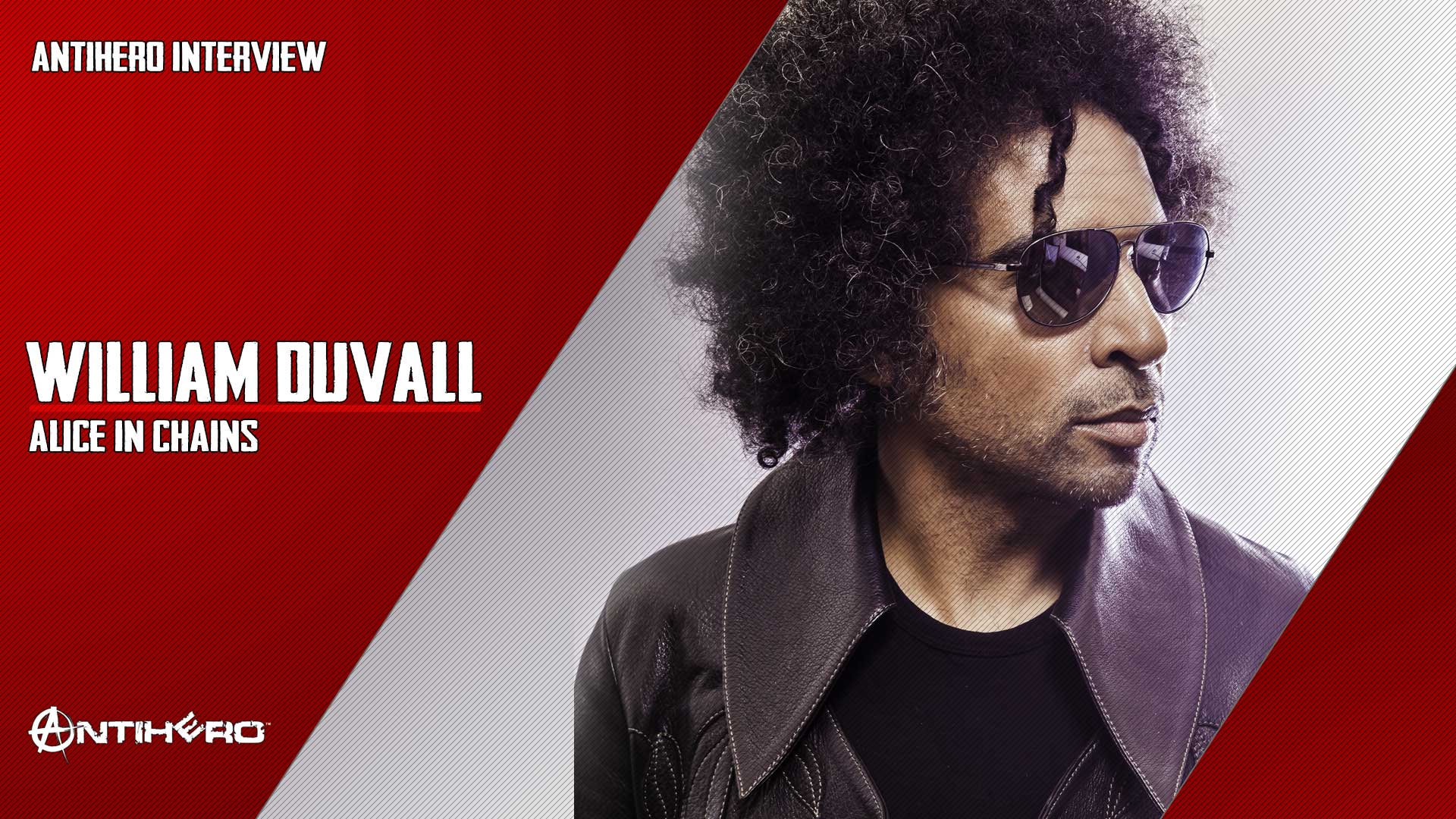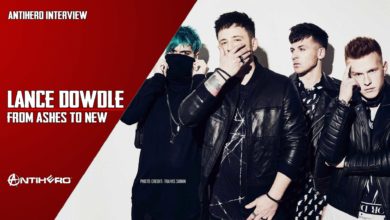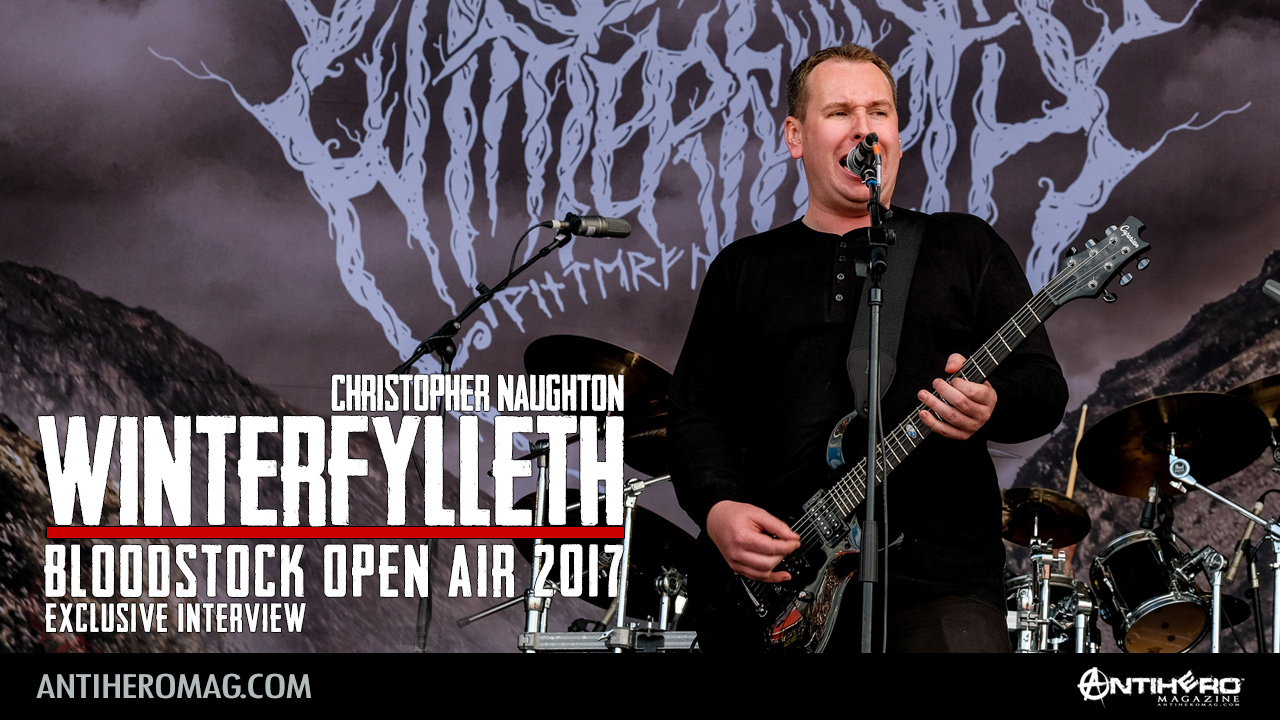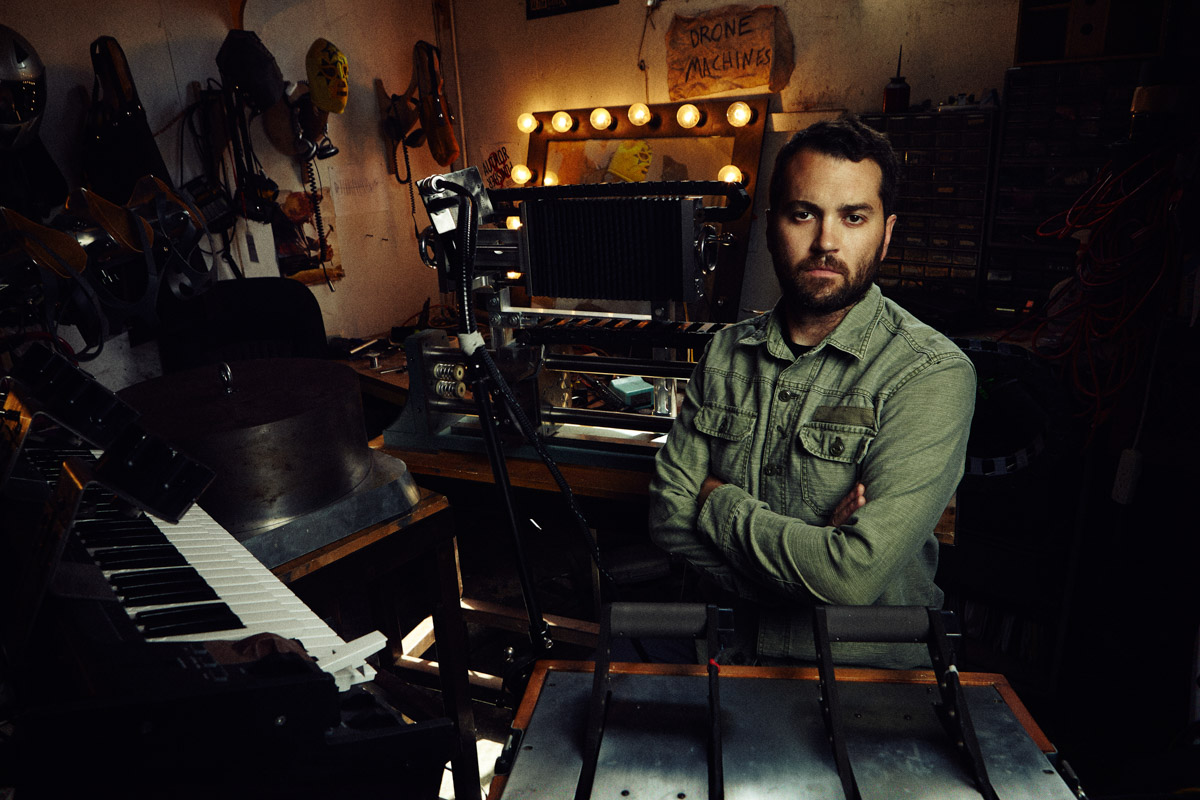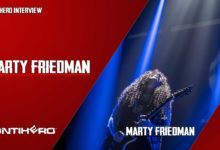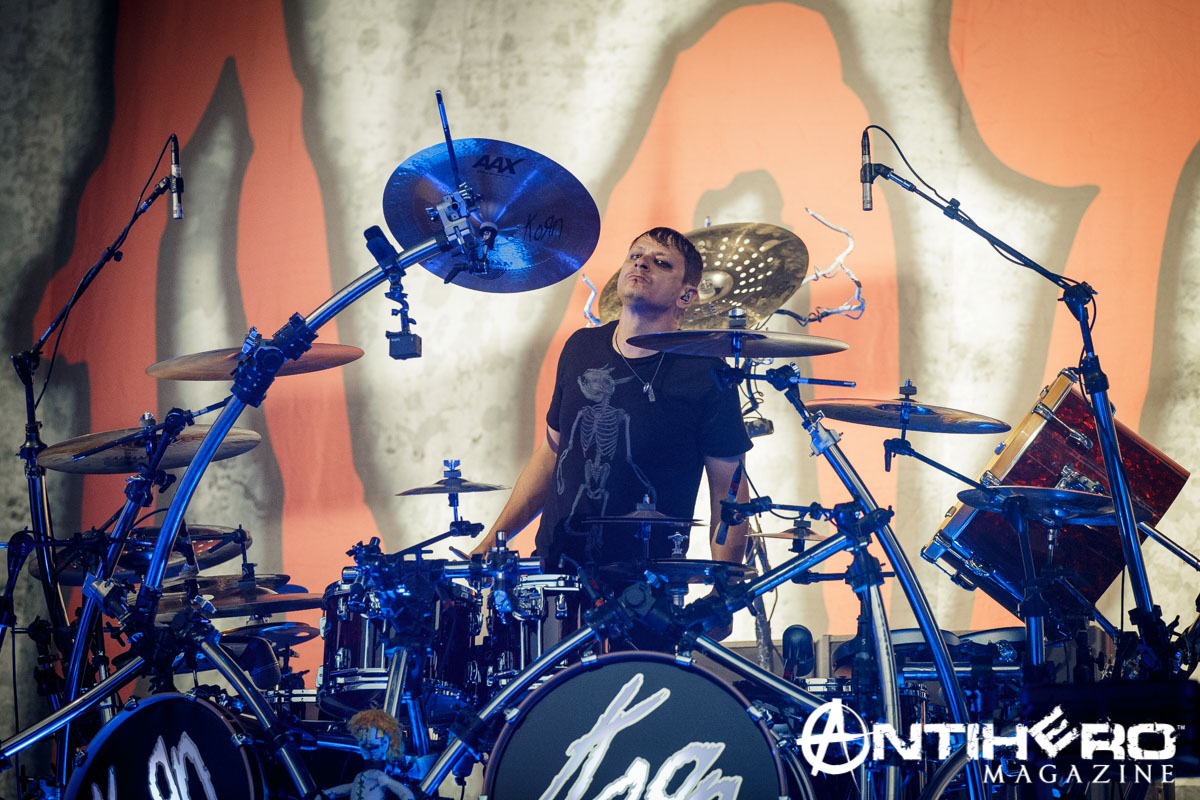William DuVall’s first solo album, “One Alone,” is a smoldering, all-acoustic affair. In contrast to the multi-layered sonic assault comprising most of his discography, “One Alone” is as sparse and intimate as it gets – part late-night confessional, part living room concert. As William describes it, “I felt the need to peel everything back. This album is strictly one voice, one guitar. It reveals the very core of who I am as a singer, guitarist, and songwriter.”
ANTIHERO: Hi William. You’ve got your solo album coming out. Just wondered why it’s taken so long for you to bring out a solo album.
William DuVall: Well I’ve been pretty busy. With all these things. Alice in Chains and then the Giraffe Tongue Orchestra record came up and, there have just been so many things happening that it was tough to find the window of time to do this solo album. And I think that window has finally presented itself. I’m really glad about that.
ANTIHERO: Regarding the actual songs themselves. Are they all new songs? Are they maybe songs that you’ve collected and built up over a period of time?
William DuVall: Some are new, some are reworked, “Comes with the Fall”, a song that I always thought could be good acoustically like in the sort of solo acoustic presentation and yeah, just put them all together and this is the one alone album.
ANTIHERO: What about the recording process then? As you stated previously you are a busy man. Did you have time off? Did you record them when you’re touring with Alice in Chains? When do you actually get time to put down the tracks?
William DuVall: Well, it didn’t take, the actual recording time was really quick. I mean eight of the songs were done in one day.
ANTIHERO: Whoa, that’s a very quick process.
William DuVall: And the remainder of the songs were done in just one evening, like a second evening session. So, actual recording time was really quick and, you know, it really was just a matter of, again, finding that window of time where you could really put the record out and hopefully serve it properly, you know?
ANTIHERO: If you could maybe walk me through the album track by track, maybe give me a little insight into the songs? What you were feeling when the songs came together? The mood, the emotion, even the songs’ subjects. Start off ‘Til the Light Guides Me Home, which is the song that you picked for the first single.
William DuVall: Yeah, that was just a song kind of inspired by family, family breakup, family dysfunction, and just kind of inhabiting that emotion of, Oh, you know, despite one’s best efforts, things are not working out the way the one would have hoped. And there are mistakes that have been made on all sides and the whole situation is really sad and really unfortunate. But we hope that, at the same time, that there might be a way to get guided back to what’s truly important and you know, that one might find the way back to the light, so to speak.
And you know, I mean, it’s by a lot of… Things that everybody, that many many people go through and on all sides of it, you know. Whether you’re the adults in the relationship, whether it’s the children, that are the products of relationships, this is something that’s pretty universal. I certainly experienced it from all sides, and you know, it’s just a tough thing. And that’s what kind of inspired that song. And I, and again, I feel it’s sadly a fairly universal thing, you know, and you can go back into one… I even mentioned the thing about the family tree and all that stuff because it’s like these issues become generational. We try not to… We try to learn from the mistakes of our parents or our grandparents, whatever. And sometimes we do, sometimes we don’t, you know.
ANTIHERO: Is that an ongoing theme throughout the album? You mentioned that the tracks themselves came from different periods of your life. I just wondered if there’s a connecting theme, something that runs through the album or does it just dip into different emotions, different feelings, different subjects?
William DuVall: Well, I think that there might be a recurring theme of wanting, desiring a deeper connection with someone else and getting to a place where you are desperate enough or fearless enough to really ask for that. And then at the same time, I think there’s also a current throughout maybe, you know, just a lot of the songs on the record where there’s that owning of one’s own mistake, you know, like the things that keep you from getting this deeper connection that you’re saying you want. A lot of times we’re our own worst enemy. And so I think those currents would have run through the record quite a bit.
ANTIHERO: Are all the tracks sort of reflecting or looking forward optimistically?
William DuVall: I think so. Yeah, I think so. Definitely. Yeah.
ANTIHERO: Okay. If we take them, do you want to go through these track by track, or you just want to talk about the album generally?
William DuVall: Oh yeah. You know, general is more, I mean, whatever you want. I’m fine with whatever you want to do, man.
ANTIHERO: Yeah, I’ll just pick out one of them myself. “Still Got a Hold on my Heart”.
William DuVall: Yeah. I mean it’s, yeah, it… Again, I think that’s one where there’s a certain fearlessness in just saying how much someone has meant to you, whether or not it ends up working out is a different question. But yeah, just that admission to yourself and to them because that particular song kind of assumes the role of you’re speaking to that person, you might actually be just only wishing you were speaking to that person, but it’s at least sort of, you know?
There’s this thing of it, “I want to communicate this, I want to communicate what you’ve meant, that you’ve been worth every tear I’ve cried,” you know? But then at the same time, there’s also kind of this acknowledgment in its expression of like, you have also really messed me over too, you know, and the whole thing of like… It’s like the bridge section, just like the sky, the rivers of rain falling down. I’ll keep on flying and crashing that plane into your killing ground. Every explosion, with ever explosion. Knowing my soul is glory bound, and then you can write on my grave that the love I gave to you, saved you while I slowly drown.
I mean there’s a duality. It’s like, “Hey, I really need you, but you’ve also really screwed me over too,” you know? Or at least, I feel like you have.
You know? And yeah. It’s definitely that- And musically, that song kind of hearkens back to me just sort of pre-rock music. You know, I like a lot of music from before the rock era
So, I like a lot of Gershwin, Ellington and Hoagy Carmichael. Those kinds of people, where the melodies are just glorious. The scope of the right, and the harmonic scope and melodic focus is just so that, you know? Especially with Ellington, my God, the harmonies in that music are just unbelievable. But yeah. So I kind of wanted to touch on some of that, you know, music that was maybe written for shows or written for really large bands or orchestras, and you know, it has a little bit of a torch song quality I guess.
ANTIHERO: Moving on then. I feel personally songs only really become alive when you perform them live before an audience. I just wondered then, regarding touring plans, do you actually have for the album itself. I mean you said earlier, you’re busy. Do you have solo touring plans to actually get out and play some, in fact, maybe the whole album live?
William DuVall: Absolutely, yes. We’ll be announcing US dates very soon and I’m looking to get over to Europe as well in 2020. I’m looking into that right now. Really hoping that comes together. I absolutely want to tour this record.
ANTIHERO: Will it be an album that you play in its entirely? I have been fortunate enough to hear it and I just think, perform it live, you’ve got to do it all. I mean, all those tracks, I mean it’s really, really beautiful.
William DuVall: I like how you think.
I liked it. No, definitely. The thing about the particular presentation of just one voice, one guitar is that it’s… I hope it will lend itself to performing the performance, yes. But also to hopefully maybe a more intimate performance experience for myself and the audience. That’s what I would hope to achieve. We’ll see.
ANTIHERO: Do you see then that because it’s a solo tour and you have a solo album, that you just want to separate it from what you’ve done musically before? Or will you be combining it with other songs that you’ve done throughout your musical history?
William DuVall: Well, you know, we’ll have to see, I mean there’s the maybe… There might be maybe a song or two off of the Giraffe Tongue Orchestra album in 2016 with Brett Hines from Mastodon and Ben Weinman from The Dillinger Escape Plan. There might be something from that that I could incorporate into the solo acoustic show. We’ll have to see; the focus is certainly going to be on the One Alone album.
ANTIHERO: Yeah. As I said, definitely. I mean, it’s a very strong album. I feel like you maybe should and could do it all.
William DuVall: I’d love to. Yeah, I would absolutely love to do that. Yep.
ANTIHERO: Just a few general questions then, taking you back. Can you recall the first music that you ever heard? Maybe something growing up?
William DuVall: Oh, well, certainly a lot of the popular R&B music of the time. I mean, that permeated everything, a lot of the Motown music, you know, Marvin Gaye and The Supremes and Diana Ross and certainly the Jackson Five were huge because they were kids like me, so it was a very sort of, “Oh my God, they look like me. They’re on television. Oh wow.” You know? That was sort of some of the early stuff. My mother loved Roberta Flack. She loved Carole King. So I mean, the Tapestry Album was playing every day in our house for about a year. Every day. And Roberta Flack, same kind of thing. It was just consistent; it was always around.
My mother actually used to go see Roberta Flack perform in the club before she was famous before she was signed, she could perform a lot in the DC area, where we are from, where my family’s from, where I’m from. And so Roberta Flack was sort of like just a local club act you know? And so, my mother and her friend, Diane, would all go, they’d always go and see Roberta, you know? Just the hot young things on the town going to see the other hot young thing performing on stage, you know? It was really, she describes it as a really cool and happy time and I can believe it was. And so that music was early, that informed my early sort of musical memory. Stevie Wonder, another huge one. Earth, Wind and Fire, another huge, huge formative musical memory. And then when it… That was just listening though, when I became sort of motivated to actually play was Jimi Hendrix, hearing Hendrix, that was it for me. That was when I knew, that’s what I’ve got to do.
ANTIHERO: What came first for you then? Guitar or singing? Or did they just go hand in hand for you?
William DuVall: It was about the guitar. That was what it was. I only wanted to be a guitar player. I never thought about being a singer until I mean, really seriously like trying to sing, you know, until I was a young adult. I always sang along with records for myself, you know, that kind of thing. My very first band, when I was in the hardcore punk era, the very first band, AVOC, Awareness Void of Chaos. Yes. Lovely name. We were a trio and by default, I sang some of the songs, but it wasn’t singing. I was trying to imitate Dez Cadena from Black Flag. I wouldn’t call it singing anymore. I was trying to approximate the Dez Cadena kind of roaring bark kind of thing.
But when it came to singing, it was much later, I gave it up. I didn’t want to do it. I just wanted to be the guitar player. I wanted to write songs, that was it, and then I started a group called No Walls because you know, we didn’t want musical confines around us.
No Walls wanted open vistas. We were kind of mixing jazz and rock and world music all together. That was the first music I was, the first songs I was writing where I couldn’t find someone else to sing it, the stuff was too personal to me. And so, the bass player in No Walls, Hank Schroy, he just said like, “Man, you should try and singing it.” And that was sort of the thing. We used to record all of our rehearsals, and so he said, “Man, just give it a shot.” So, we did, and we recorded it and we listened back and he was like, “Man, that’s really good.” You know? And that was sort of the first thing where I was like, “All right, you know, I’ll give it a shot.” I was very reluctant, very reluctant, believe it or not. But now here we are.
ANTIHERO: Talking about a solo album, with just you and a guitar.
William DuVall: Yeah. It’s just funny how life works out.
ANTIHERO: Yeah. Yeah. How do you view your own musical legacy? Obviously, I mean, joining Alice in Chains, it must have brought a huge weight of pressure, but I mean I think that three albums down the line now, you’ve certainly made your mark, and created your own, part in the band’s history. You’ve been obviously accepted by fans. I mean you’ve got three albums out with that band like you’ve created your own part of their history.
William DuVall: Well yeah, I guess. I mean, yeah. Yeah. Is there a particular question around it?
ANTIHERO: Yeah. How do you view what you’ve created musically? Whether it’s going for those early hardcore fans, right up to what you’ve done with Alice in Chains and moving forward with this solo album. Is it something that fills you with pride?
William DuVall: Actually, yeah. I don’t think in terms of legacy in that way very much. It’s more like, this is just the work I’m doing now and I’m trying to move forward with that because it is so much that goes into that, that you don’t really have a whole lot of time to look back and consider the past. But I mean, yeah, when I do take a glance back over my shoulder, yeah, it’s not bad. I mean the early hardcore thing was such a special, wonderful thing. It’s very hard to… For the people that weren’t there, and weren’t part of it, it’s a very difficult thing to explain how amazing and special it was. And it was very small and there are just a few of us, all over the world, who are kind of a member of that club, so to speak, and you certainly took a lot of hassle for being part of it back then. And then it went on to transform the culture.
I mean everything, all the little stuff we were involved in, the little band games and the flyers and the little shows and the storefront venue because you can’t get a club to let you play. You invent your own kind of gig situation, you know, and there’s no permit, there’s no nothing, there’s no permit, no security. Everything is illegitimate by the measure of mainstream society and the music itself was considered complete noise, this is worthless. In fact, to the extent that it’s motivating anybody to do anything, like you know, motivating kids to do anything, it should be stopped. You know, I mean there was all this resistance, and all this stuff that went with being involved in that scene back then, and it went on to just totally transform the mainstream culture, and so that’s obviously that’s a cool thing.
I mean, and then all the work that I did sort of post-punk, you know, very proud of it. All the Comes with the Fall record. Extremely proud of it. The work I did before that with No Walls. Yes, very proud of it. You know, a lot of what No Walls were doing was sort of what Jeff Buckley would end up doing a little bit later. Where it’s like, oh, it’s this sort of really kind of adventurous, emotional singing that mixes rock and world music and folk music and sort of comes up with this interesting unique blend, you know? And he did it his way, but prior to that, we did it our way and yeah, I loved that work.
And the Comes with the Fall record. Yes, I’m so proud of those records and so proud of that song. And obviously then that led to me being asked to join Alice in Chains, Comes with the Fall is directly what led to.. Alice in Chains I was a huge fan of that band. And that’s what paved the way for our whole thing. So yeah, and the three records we’ve done and all the shows. My God, all this touring we’ve done, I’m in the midst of it right now. I mean, you know, we’ve played a lot of shows. We have hit a lot of stages together, and we’ve made a lot of people happy and yeah, that’s a great feeling.
ANTIHERO: Do you still have hopes, dreams, and ambitions?
William DuVall: Oh yeah. I’ve not even hardly gotten started. Yeah, I totally feel like I haven’t done anything. At the same time, yes, I’m proud of it, I’m proud of that. It just feels like, “Oh, I’ve barely scratched the surface.”.
And that’s why it’s so important to get this record out and keep it moving. And it’s one of the reasons why I wanted this album, One Alone, to be so reductive, you know, it’s just those one voice, one guitar, because…
All right we view it as a reaction to all the rock records I’ve made over the last, even just the last 20 years, you know, forget the hardcore punk stuff, even this last 20 years, the sort of rock-based records I’ve made, you know… It was time for something different.
And this was about as different as I could get whilst still being totally sort of self-reliant. It’s like, okay, let’s just pair it down to just one voice, one guitar. And then at the same time, it’s sort of like, this is a great starting point for what I hope will be more records under my own name, that can then incorporate more of the kind of sounds that I’m perhaps better known for. You know, getting back to electric music, getting back to rock and roll, getting back to those… You know, the dynamic version of electric rock and roll that I really like. But this is a great starting point for anything that might come in the future. You know?
ANTIHERO: It also involves yourself opening up a lot more emotionally. And maybe sharing stuff that you haven’t shared before through song.
William DuVall: Sure, yeah, absolutely. It’s almost like you could view it as like an emotional and a musical cleansing by fire, you know? It’s sort of like when you’ve got to burn the earth so that the soil can renew itself, kind of thing. It’s like it has a little bit of that feeling of like, yeah, we want to get really raw. And that way, it’s sort of like all bets are off now. It’s like, okay, this guy can… He’s liable to come at us with anything, you know?
And we always will have this record, this One Alone album as sort of a touchpoint, you know, a sort of a base to go back to and say like, “Okay, yeah, well if you want the most sort of purest distillation of who this person is, go back to this record.” And there it is, you know?
ANTIHERO: Yeah. Going to surprise a lot of people as well, who only maybe know you for Alice in Chains.
William DuVall: Yeah, exactly. Yeah. And so, yeah, this is a very, kind of, a bold way of introducing myself in to… Or maybe reintroducing myself to, like you say, the folks that know Alice, and I would hope it might be a doorway into my history as well, so they can go back and look at the Comes with the Fall records and all the stuff before, and say “Oh wow, okay,” you know? Because people are discovering that stuff all the time anyway. But this just sort of puts the spotlight on like, oh, he’s got something new coming out, Hell he’s going to be… It naturally leads to discussions about my history and hopefully, it will be a nice way for people to walk in and check that out.
ANTIHERO: Okay. Just a couple then. Who would be the most influential musician that you have worked with? Would it be somebody like Jerry Cantrell? You mentioned Bill from Mastodon or indeed somebody that maybe the public isn’t generally aware of?
William DuVall: Wow, that I’ve worked with?
ANTIHERO: Yeah, that’s maybe influenced you, taught you the most.
William DuVall: Gosh, yeah, I mean, you know, the cool thing is to have met a lot of cool people over a bunch of years. I mean even before Alice in Chains, I was very close friends with Vernon Reid from Living Colour.
He was a huge fan of No Walls and actually tried very hard to use whatever, sort of, cachet and attention that he had at the time because it was 1988, ’89, Living Colour was very hot property. He tried to use a lot of that political clout to get No Walls signed, you know?
Took us all over New York. No, brought us to New York, took us all over the place, played every place. He was a really cool guy and still is, just a great friend, and I would say he was influential in terms of just watching someone negotiate fame and interfacing with the popular culture in a way that was inclusive and yet uncompromising in terms of who he was, you know? And how he thinks. And it was a very cool thing to watch that.
And it was a cool thing to watch some of the bands in Seattle that got very famous very quickly and had to sort of deal with… You know, again, the onslaught that goes with that. You know, I mean a group like Nirvana, I had a great deal of empathy for Kurt Cobain, because he was someone who… He was a little later to the party than my friends and I, in terms of getting into punk rock, he was more second or third generation. But he was the one that got dealt that hand, that deck of cards, where it’s like you are the flashpoint where all of this stuff, coming into the mainstream, you are the guy. And to have had to face that, he was bringing punk values to mainstream culture.
He was trying to do all the other things that my friends and I used to sit around in little ballrooms talking about and philosophizing over and all the things that the band ‘zines, that we loved back in those days, like Maximum Rock n roll, all the articles, the opinion pieces, the dialogue, the struggles that were going on about racism, about misogyny, you know, women rights and their choices. All of these struggles that were going on in the underground, Kurt Cobain became the flashpoint for that dialogue entering mainstream culture for our generation. And it was quite a weight to deal with.
And I certainly admired the struggle, you know, I certainly admire the struggle and, and I would say that for, you know, for all the bands, that became really big in that time, they were trying to write the book on how you deal with fame and, you know. And yes, I’ve learned a great deal working with the guys in Alice, you know, we get to write our own ticket in a way that many, many bands never have been able to do and you know, it’s a privilege and it’s also a responsibility, you know? I was always very, very singular and had a lot of very strong opinions and focus and drive with regard to what I wanted to do with my own work and how I want to present myself and all that.
And it’s been very interesting to join a band, where they have a similar kind of determination and focus about like, “This is how we want to be portrayed. This is what we will do. This is what we will not do. This what we will tolerate from someone else. This is what we will not tolerate from someone else.” It’s been very interesting to be in this machine for this many years and watch how this thing rolls and actually be a huge part of making it roll and dealing with everything, whether it’s the press, the major record labels, you know? It is all the stuff you have to deal with. Everything that has to be done by a huge committee when you’re in a band like this, watching and also driving and participating in what makes this go. It’s been a great learning experience, tremendous.
ANTIHERO: Just a final one then. If the roles were reversed, who would you like to personally sit down and interview? Maybe somebody that’s inspired you? Personal hero, maybe not even a musician?
William DuVall: You know, I forgot to mention Wayne Kramer as one of the influential people that I’ve worked with. I got to front the MC5-
The MC5 for two really important and wonderful shows. One in London at the Royal Festival Hall, where we headlined, Primal Scream opened. And another in the countryside of France, in a place, in the French countryside. We did a festival with the Raw Power Stooges.
That was actually Michael David’s last performance on stage ever. And he passed away not long after that. Rest in peace. Wayne Kramer is probably the most influential person that I’ve worked with, in terms of someone who’s just like that dude and that band were like superheroes to me. And then to actually be in it and be on stage with those guys, to actually get to be the guy that says, “Kick out the jams, motherfucker” and mean it. You know what I mean? Like that was heavy dude, heavy dude. I love that guy. And love what he contributed to the culture so much, like so much reverence for it. If there was somebody that I could go back and interview.
That would probably have to be Hendrix.
Because not only was he musically easily one of the heaviest guitarists I’ve ever encountered to this day. I mean all the heavy jazz music that I love, Ornette Coleman, all the people I’ve met, you know, who are just so incredible. The Hendrix is right up at the very top of everybody, regardless of any era, any genre of music. He is way up there. And the spiritual power in what he was doing, the sonic innovation, and also coming at that time, that particular nexus of civil rights, you know?
Cultural upheaval, you know, musically and everything, all these suburban kids saying, “I don’t want to go to that war.” Just everything happening all at that one time. He occupied a huge position in the culture during a time of tremendous cultural change. So on top of all the musical stuff, there’s all the other stuff that went with it. And then also, of course, the racial dynamic, because he was, you know? He was like black and was like dealing with everything, you know?
The highest-paid musician at the time, playing to largely white audiences during a period where the establishment is looking with a lot of fear at what it’s own children are doing and saying back to them as the authority. It’s like, “Whoa,” there’s nobody, there’s nothing heavier than that. It’s like he’s kind of the guy, you know? So-
… I’d have to, if I could sit down and really rap with somebody, like in a matter of fact, I’d almost want to do it off the record really. I’d love to interview him for real, but I would also even more like to just sort of, “Okay, face off now, okay, let’s really get down to it,” you know?
Like that’d be great.
ANTIHERO: Okay. That’s me finished then. Love the album. Good luck with that and hope to get to see you in the UK when you come over next year. You were hoping. Yeah?
William DuVall: Yeah, man. That’s what I’m hoping for. Yep. Thank you, man. Thank you so much.
ANTIHERO: It’s been good. Thank you. Cheers.

